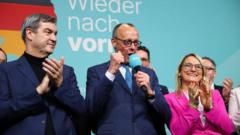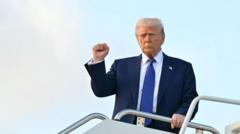Germany's recent elections have set the stage for a potential transformation in leadership, with Conservative leader Friedrich Merz now positioned to take the mantle as the next chancellor, contingent upon his ability to secure a governing coalition.
Friedrich Merz Emerges as Germany’s Next Potential Chancellor

Friedrich Merz Emerges as Germany’s Next Potential Chancellor
The parliamentary elections signal a shift in Germany's political landscape, as voters express discontent with the incumbent left-leaning coalition.
In a decisive electoral outcome, Germans cast their ballots for change on Sunday, favoring centrist conservatives and pushing the far-right party into a significant second-place finish. This electoral shift signals a clear dissatisfaction with the current left-leaning government, particularly in areas concerning economic management and immigration policies. Friedrich Merz, the leader of the Christian Democratic Union (CDU), emerged as the frontrunner for the chancellorship, rallying supporters in Berlin with a pledge to quickly foster a parliamentary majority and re-establish Germany’s prominent role in European affairs.
The elections were called seven months earlier than scheduled, following the failure of the governing coalition led by Chancellor Olaf Scholz, which had garnered considerable unpopularity over its term. The voter turnout was notably high, reminiscent of decades past, reflecting the populace's engagement in the critical political juncture.
Merz, aged 69 and with a background in business, campaigned on promises to tighten immigration controls while also proposing tax reductions and deregulation aimed at stimulating economic growth. His platform includes a commitment to adopt a firmer foreign policy stance, particularly in support of Ukraine, in the context of the shifting geopolitical landscape under the new Trump administration, which has sparked apprehensions over traditional alliances and relationships with Russia.
Notably, as the campaign drew to a close, Merz expressed concerns over the state of democracy in the U.S. under Trump's leadership, along with a strong denunciation of what many Germans interpreted as the U.S. administration's interference in favor of the far-right Alternative for Germany (AfD) party. The potential coalition-building process now lies ahead for Merz, with the necessity of aligning with other parties to establish a governing majority and shape Germany’s and Europe’s future in response to evolving global challenges.
The elections were called seven months earlier than scheduled, following the failure of the governing coalition led by Chancellor Olaf Scholz, which had garnered considerable unpopularity over its term. The voter turnout was notably high, reminiscent of decades past, reflecting the populace's engagement in the critical political juncture.
Merz, aged 69 and with a background in business, campaigned on promises to tighten immigration controls while also proposing tax reductions and deregulation aimed at stimulating economic growth. His platform includes a commitment to adopt a firmer foreign policy stance, particularly in support of Ukraine, in the context of the shifting geopolitical landscape under the new Trump administration, which has sparked apprehensions over traditional alliances and relationships with Russia.
Notably, as the campaign drew to a close, Merz expressed concerns over the state of democracy in the U.S. under Trump's leadership, along with a strong denunciation of what many Germans interpreted as the U.S. administration's interference in favor of the far-right Alternative for Germany (AfD) party. The potential coalition-building process now lies ahead for Merz, with the necessity of aligning with other parties to establish a governing majority and shape Germany’s and Europe’s future in response to evolving global challenges.





















